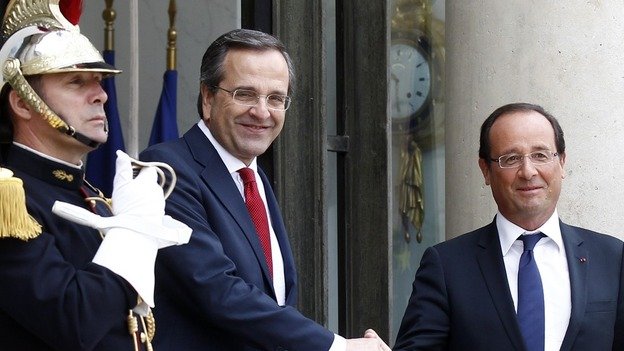
French President Francois Hollande has urged Greece to prove it can pass reforms demanded by international creditors, after talks with PM Antonis Samaras.
Greek PM Antonis Samaras has been appealing for more time to introduce the reforms.
But Francois Hollande said no further decision could be taken until European ministers consider a major report on Greece’s finances, due in September.
Donors including the EU insist Greece has to make major spending cuts.
These are needed if Greece is to secure the next tranche of its bailout.

The Greek government is under pressure to win concessions from Europe to placate the tired nation and lessen the likelihood of a destabilizing period of social unrest.
Antonis Samaras is seeking an extension of up to two years for the necessary reforms, in order to provide Greece with the growth needed to improve its public finances.
In talks with German Chancellor Angela Merkel earlier this week, he was told that the decision would depend on a report from the so-called troika – the International Monetary Fund (IMF), the European Central Bank (ECB) and the European Commission.
Francois Hollande also said Europe needed to consider the report before it could make any further decisions on Greece.
He said decisions on whether to grant Greece more time should be taken when European finance ministers meet in early October.
“We’ve been facing this question for two and a half years, there’s no time to lose, there are commitments to reaffirm on both sides, decisions to take, and the sooner the better,” he said.
Greece’s continued access to the bailout packages depends on a favorable report from the troika.
Athens is trying to finalize a package of 11.5 billion euros ($14.4 billion) of spending cuts over the next two years.
It is also being asked to put in place economic and structural reforms, including changes to the labor market and a renewed privatization drive.
The measures are needed to qualify for the next 33.5 billion-euro installment of its second 130bn-euro bailout.
Greece needs the funds to make repayments on its debt burden. A default could result in the country leaving the euro.